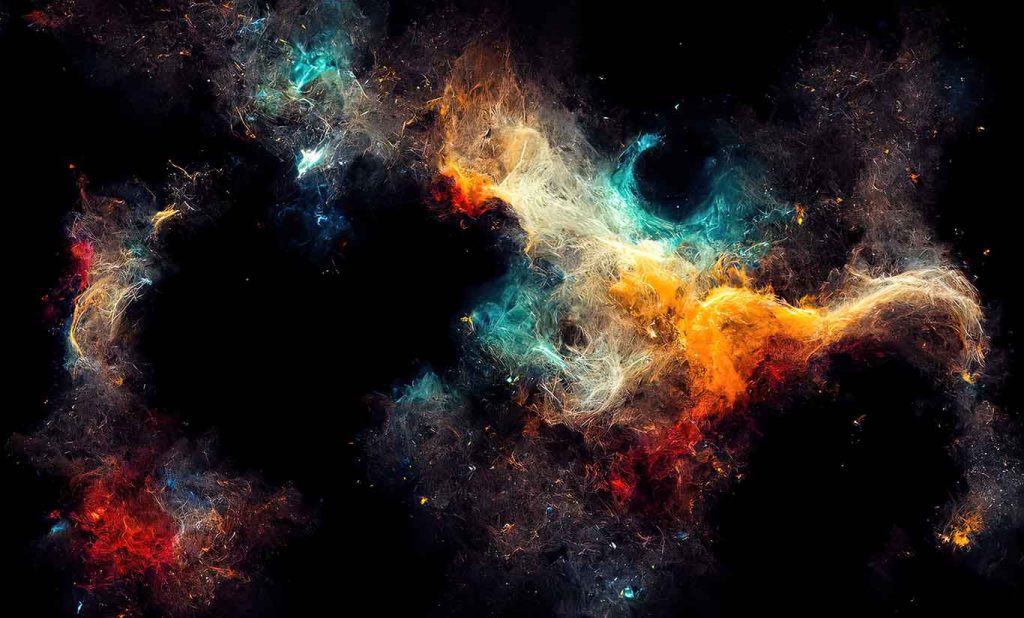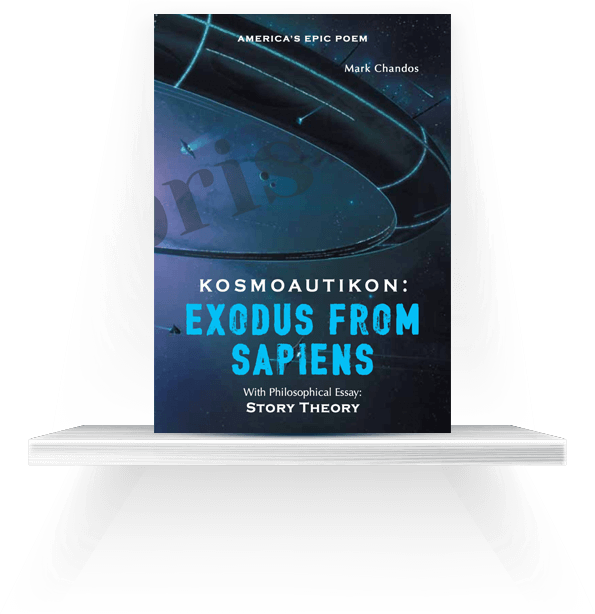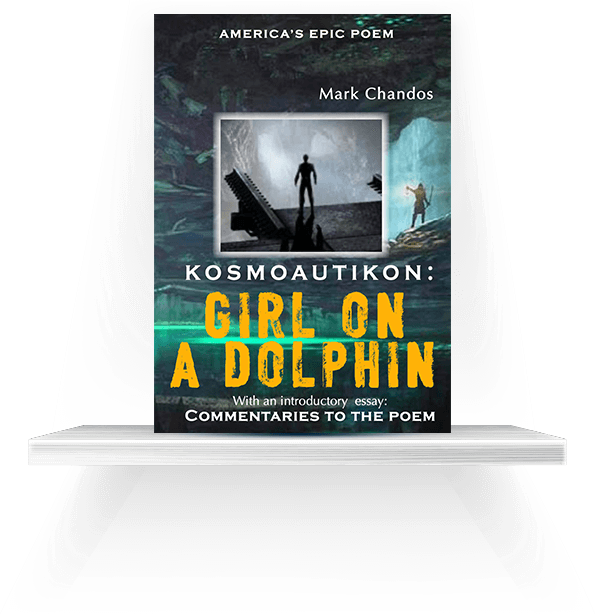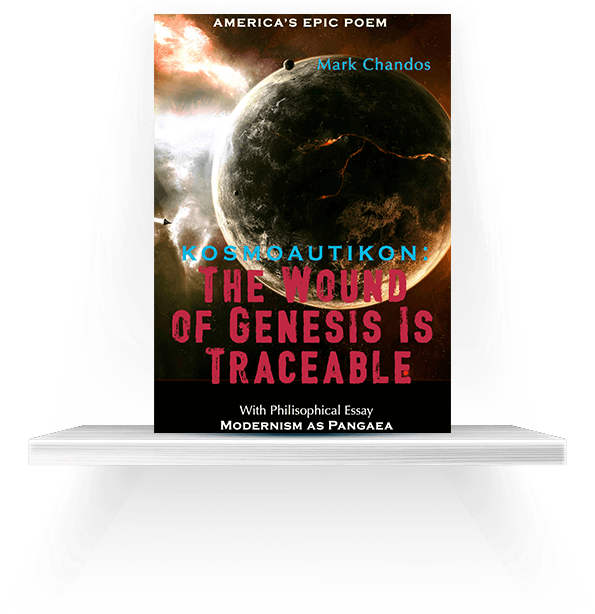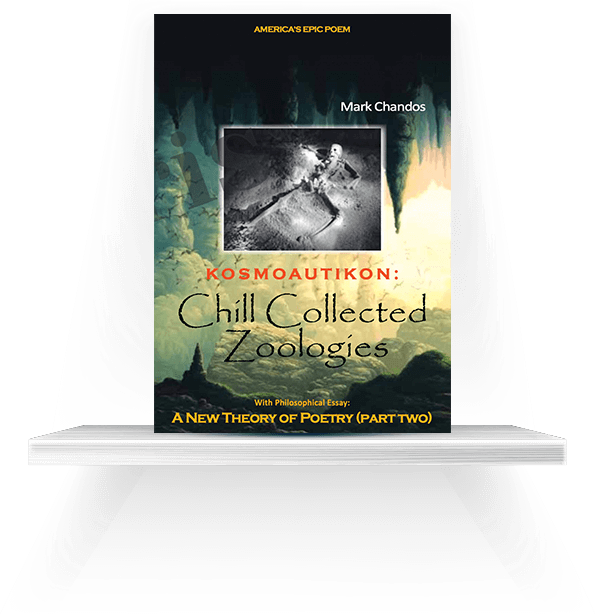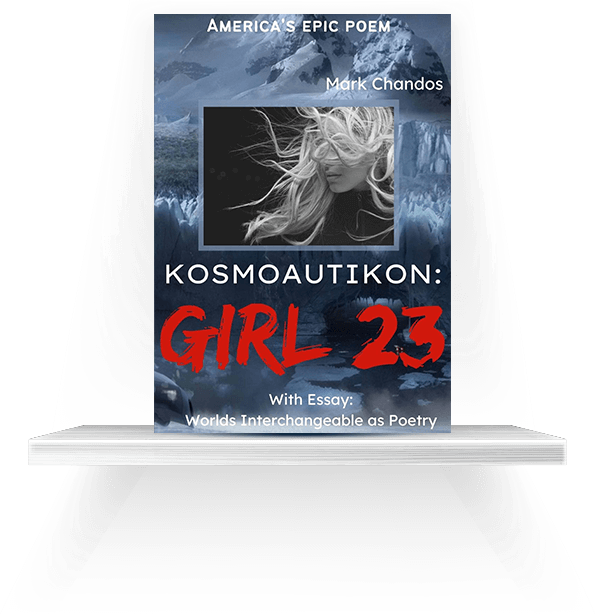My goal is not only a poem of value and interest – but a new category of memorable speech. The honor of poetry is its unique, one-time charge of extra-cosmos information. The poet should have the quality of being “just-so.” The test of the alien quality of poetry – its difference – is that poetry cannot be paraphrased (in prose) and maintain the same charge. Prose – Intra cosmos – can be paraphrased – in any language. The honor of prose is its reliability as a vehicle for repetition – and sameness. Poetry is not information that can be transferred into any other idiom. Poetry is not an expression where the words may be rearranged.
As any poet, I have to make a test of contemporary speech. I had to decide what is the most powerful expression of Homo sapiens. In my thesis, I will test if deep human information is exclusively repeatable (as inferred by science), or if deep human information is a one-time event.
Story Theory, like poetry, seeks to eradicate its enemy – the banality, the sameness, the mediocrity of modernism. Everyone has the same electronics, the same jeans, the same t-shirt, the same sneakers, and the same belief in narrow and corrupted material science. Each is bankrupt and played out.
This is the fault of modern science: No civilization can endure when the priest of any single discipline declares to all 99.99% other citizens, “Trust us, we will think for you. We will tell you what reality is – and let you know.” This is the toxic relationship that science shares with all modern peoples.
No average person on the street, and more to the point, no graduate holding a Master’s degree in mathematics, can understand or fact check a typical scientific paper that is published in academic journals. This de facto makes science, in operation, a belief system. We follow what science tells us – though we are unable to verify the math or the logic. Not only is science so specialized that no fellow scientist dare critique another scientist’s work across specialties (and thus there is nothing to be said at all) but opportunities for corruption are flagrant and exponential.
Story Theory reveals modernism and science as only another school of poetry. Science, in this thesis, is a paper tiger made with self-referent data sets. Science uses symbols to represent human reality – and this is exactly the protocol of a school of poetry. Symbols are used to represent things – and often these things do not even exist except in the mind of the believer. As science is thus a school of poetry, it can be countermanded by an equal and opposite school of poetry.
Story Theory is a protest against the sameness of modernism because Homo sapiens properly should seek out further innovations within the exponents of consciousness. Science is played out – essentially Victorian in its foundation
Modernism insists that all human biases must be eradicated so that all men are made the same. “Sameness” is modernism’s chief idea of achieving justice and social harmony – to level any group, individual, school, idiom, or society that claims superiority.
We protest. Homo sapiens was designed for the selection of good and evil, a selection of beauty and non-beauty, a rigorous selection of art and non-art – not enforced equality of sameness.
Humans are not equal in mind or body. All art is not equally brilliant and excellent. In truth, most persons are deficient and deformed in many criteria. But in the modernist race to sameness can no longer face these facts.
Modernism ignores the need for triumphant hierarchies of excellence and superiority in Homo sapiens, and thus, modernist misprision is a source of injustice and rage. (We see the rage of youth against modern banality and sameness in the proliferation of graffiti in all our Western cities. Graffiti is protesting against sameness).
Modernism equates the vote of the indolent and ignorant may count as much as the industrious and the learned. Liberal modernism replaces one tyranny of injustice (Fascism, Communism, etc.) for another totalitarian ideology (total surveillance by secular liberalist police states and state education enforces newly radicalized liberal ideologies).
Modernism insists that all suffering, all wars, all perils are over and we must be pacified, renounce aggression against other cultures, consume modern goods and accept without protest the information of modernist institutions. Nothing is further from real humans.
In Story Theory we believe there is a race for the superiority of excellence – not pacific toleration of mediocrity. Modernism is de facto a state that enforces mediocrity in culture – or at a minimum of silence from those who do disagree with the modernist ideological agenda. In modern ideology, no culture or person can be deemed objectively better than other persons or cultures. The effect of this ideology (in education) is the total denigration of standards or literary criticism. No critical authority could say one form of art or poetry was better than another since to do so would be a form of cultural arrogance or racism.
Modernism is now an ideology where no one can opt-out or critique the dogma of postmodern liberalism in the universities or education – or they are named bigots or racists. And this chills free speech until there is only silence.
By treating all humans as terrestrial as barn animals, each exactly useful only for their equal consumerism, modernism blocks the free operation of a sentient human mind. Humans select, their mind is made to make choices, choices of excellence over mediocrity.
Consciousness operates by making a severe selection of qualities. The eye and ear may only select a few points of data – from a cacophony of possible data. Consciousness cannot accept all things as equally valid. Modernism attempts to promote all data as equally valid – and this quickly turns to white noise.
There must be a selection between values for consciousness to operate. Consciousness selects. Stories select. Poetry selects. Men select. Each human, by necessity, is deeply learned in the use of bias. A human may only detect his good – or his danger – by the possession of bias. Any strong mind must be free to shame the establishment. Thus every human speech must be free to reveal its bias – to promulgate with freedom its war of good and evil.
Commercialism, that enforces sameness of cultural consumption, blocks the radical innovation of the rogue poet. There cannot be a strong theory of poetry without a war of good and evil. Since no consumer demographic can ever be disprivileged in capitalism (for fear of boycott), modernism does not want to wage any war of good and evil. Modernism thus has no use to the strong poet. There are millions of fictional books in a modern bookshop – each contains a numbing sameness and each is inundated with modernist clichés.
The poet selects his language with more necessity than any other human speaker. Memorable speech, following the protocol of consciousness, should make a severe selection of excellence to mature to its highest idiomatic expression.
Story Theory seeks a Caravaggio, but modernism gives us Mr. Rogers. That is, consciousness and speech the poet seeks must be biased with ruthless selection – not safe selection. To the strong poet, consciousness conducts a war of good and evil – and this severe selection of possible life forms is active at all times. As the reader may test, no human can live a week without facing deeply meaningful decisions of moral bias. The human exists only to be faced with difficult choices.
Modernism, supplanted by scientism has one message to the society of non-mathematicians, “Trust us, we will think for you. We will tell you what reality is.” Modernism is insidious and must be escaped by all means.
Modernism intervenes in the free agency of human peril – by attempting at every turn to remove individual peril. Modernism seeks to remove the consequence of peril and thus the occasion for free choice of bias. Modernism ensures that only the choice of a banal, safe, mediocre modernism is made – and only this modern speech is allowed in the public space. Modernism attempts to arrest the operation of free and aggressive consciousness. For this cause, the strong poet is at war with modernist clichés. That is to say, he has to be free to aggressively dissect the indices of human perils. Human mythic code will not be cheated – only delayed with misprision.
The strong poet is at war with the constraints of modern, ideological speech. He chooses war as a more honest path of clarity. I prefer to take up arms against a hostile and unequal nemesis – rather than sitting in a cubicle manned by university professors and medical social workers. The truth is, no one wants to be helped by a stranger in a cubicle – one that hands out a list of our diseases and psychotic medicines. The strong poet seeks a race for supremacy – not solvency and sameness. He does not come with soothing creams – he arrives with a sting. If he does not sting – and sting precisely – he is not a strong poet.
Modernism counters the dangers inherent in speech by making all speech banal – and all men exactly equal and mediocre. That is, secular modernism takes away any extreme situation or any untoward peril, any troublesome condition. Yet the result of modernism, first noted by Kafka, is the confused banality, the meaningless, the desperation of the modern environment. In modernism, there is no philosophical, no intellectual supremacy of choice of qualities, only sameness of quality. In modernism, philosophy or religion are both wounded moralities – and neither dares give final answers – or to believe in any final answers. But they are still reliable consumers. Clarity of thought is assiduously avoided. Under modernist democratic socialism, sameness of wealth somehow equals the highest ideal of justice.
The strong poet will oppose this state. Why? When all men are the same, that means that the minds of men are the same – and bound together like sheep. Thus, in Story Theory, ideologies as communism, fascism, and the technological surveillance of liberalism are exactly equal in results – they are equally totalitarian. When human speech is suppressed, the human mind is suppressed. The bitterness of the liberal is that he knows he will never achieve true greatness. The liberal is the worst kind of poet. He is merely banal, smug, and self-referent. His poetry has no reference to ruthless, dangerous, or scientific humans. He has no rage. He wants to get along. He does not seek a test of supremacy. He assumes the exact (and enforced) normalcy of liberal ideology.
Modernist prose poetry accepts newspaper speech because the language of a newspaper is banal – and thus, since all speech is made banal it also irrelevant, as modern prose poetry is irrelevant – and, thus, it is harmless to modernism. Modernism struggles to eradicate the human enchantment of speech. How? By allowing machines and political control to remove, scan, and filter all human bias from communication. Why? Because to modern states, free selection of bias is suppressed as a threat to public safety. We can test this. In any university free speech, that is, non-liberal speech alarms a liberal academic, and you will be reported to the authorities. Thus, for their good, and to ensure liberal outcomes, modernism does not scruple to place all citizens under 24-hour surveillance.
Modernism (as industrialized, socialized, capitalistic democracy) wishes to eradicate all biases – all distinctions of quality, including gender, education, excellence of physical attractiveness, in fact, any clear selection of cultural beauty. Consequently, any severe selection of beauty is a bias that cannot be tolerated in an ideology of mixed demographics (as modernism).
Story Theory opposes the banality of modernism. Consciousness ruthlessly seeks to eradicate all equals, all banalities, all sameness. Consciousness only makes severe selections of values (excellences). Consciousness, thus, seeks strong biases. Consciousness does not tend toward extinction or nothingness. Consciousness tends towards something – that is, consciousness seeks a severity of bias. To seek something is a strong existential bias.
Modernism, thus, seeking to eradicate all human bias, mistakes the nature of human consciousness. Modernism is not only blind – it is dangerous. Modernism cannot account for human consciousness. Modernism – as science – cannot explain the nature and origin of human consciousness. For example, why is there something (bias) – as opposed to nothing (extinction) – in being? Science cannot explain the bias of immortal speech. Everything flows from the unknown.
Conclusion? Our critique of modernism is that it attempts to solve the problem of human speech (and thus war) by eradicating the biased elements of speech – with the legislation of banality – with surveillance of human speech by machines. Modernism avoids the problem of bias (and thus war) by legislating mediocrity – that is, outlawing all biases. Modernism, acting as dialectic hegemon, proscribes all biases – except its own. There is evidence of this thesis. We are now under totalitarian surveillance.
As under the other preeminent modernist, technological ideologies, fascism, and communism, a leviathan liberalist state enforces societal sameness across an increasingly desolate globe.
Modernism is a problem for the mind of Homo sapiens.

